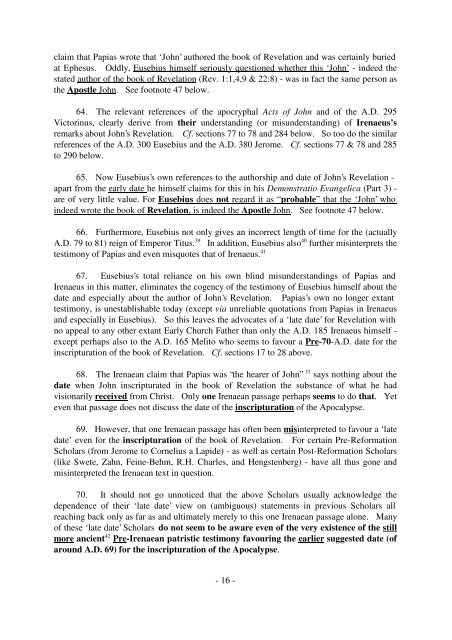JERUSALEM; ROME; REVELATION - The Preterist Archive
JERUSALEM; ROME; REVELATION - The Preterist Archive
JERUSALEM; ROME; REVELATION - The Preterist Archive
You also want an ePaper? Increase the reach of your titles
YUMPU automatically turns print PDFs into web optimized ePapers that Google loves.
claim that Papias wrote that ‘John’ authored the book of Revelation and was certainly buried<br />
at Ephesus. Oddly, Eusebius himself seriously questioned whether this ‘John’ - indeed the<br />
stated author of the book of Revelation (Rev. 1:1,4,9 & 22:8) - was in fact the same person as<br />
the Apostle John. See footnote 47 below.<br />
64. <strong>The</strong> relevant references of the apocryphal Acts of John and of the A.D. 295<br />
Victorinus, clearly derive from their understanding (or misunderstanding) of Irenaeus’s<br />
remarks about John’s Revelation. Cf. sections 77 to 78 and 284 below. So too do the similar<br />
references of the A.D. 300 Eusebius and the A.D. 380 Jerome. Cf. sections 77 & 78 and 285<br />
to 290 below.<br />
65. Now Eusebius’s own references to the authorship and date of John’s Revelation -<br />
apart from the early date he himself claims for this in his Demonstratio Evangelica (Part 3) -<br />
are of very little value. For Eusebius does not regard it as “ probable” that the ‘John’ who<br />
indeed wrote the book of Revelation, is indeed the Apostle John. See footnote 47 below.<br />
66. Furthermore, Eusebius not only gives an incorrect length of time for the (actually<br />
A.D. 79 to 81) reign of Emperor Titus. 39 In addition, Eusebius also 40 further misinterprets the<br />
testimony of Papias and even misquotes that of Irenaeus. 41<br />
67. Eusebius’s total reliance on his own blind misunderstandings of Papias and<br />
Irenaeus in this matter, eliminates the cogency of the testimony of Eusebius himself about the<br />
date and especially about the author of John’s Revelation. Papias’s own no longer extant<br />
testimony, is unestablishable today (except via unreliable quotations from Papias in Irenaeus<br />
and especially in Eusebius). So this leaves the advocates of a ‘late date’ for Revelation with<br />
no appeal to any other extant Early Church Father than only the A.D. 185 Irenaeus himself -<br />
except perhaps also to the A.D. 165 Melito who seems to favour a Pre-70-A.D. date for the<br />
inscripturation of the book of Revelation. Cf. sections 17 to 28 above.<br />
68. <strong>The</strong> Irenaean claim that Papias was “the hearer of John” 37 says nothing about the<br />
date when John inscripturated in the book of Revelation the substance of what he had<br />
visionarily received from Christ. Only one Irenaean passage perhaps seems to do that. Yet<br />
even that passage does not discuss the date of the inscripturation of the Apocalypse.<br />
69. However, that one Irenaean passage has often been misinterpreted to favour a ‘late<br />
date’ even for the inscripturation of the book of Revelation. For certain Pre-Reformation<br />
Scholars (from Jerome to Cornelius a Lapide) - as well as certain Post-Reformation Scholars<br />
(like Swete, Zahn, Feine-Behm, R.H. Charles, and Hengstenberg) - have all thus gone and<br />
misinterpreted the Irenaean text in question.<br />
70. It should not go unnoticed that the above Scholars usually acknowledge the<br />
dependence of their ‘late date’ view on (ambiguous) statements in previous Scholars all<br />
reaching back only as far as and ultimately merely to this one Irenaean passage alone. Many<br />
of these ‘late date’ Scholars do not seem to be aware even of the very existence of the still<br />
more ancient 42 Pre-Irenaean patristic testimony favouring the earlier suggested date (of<br />
around A.D. 69) for the inscripturation of the Apocalypse.<br />
- 16 -
















